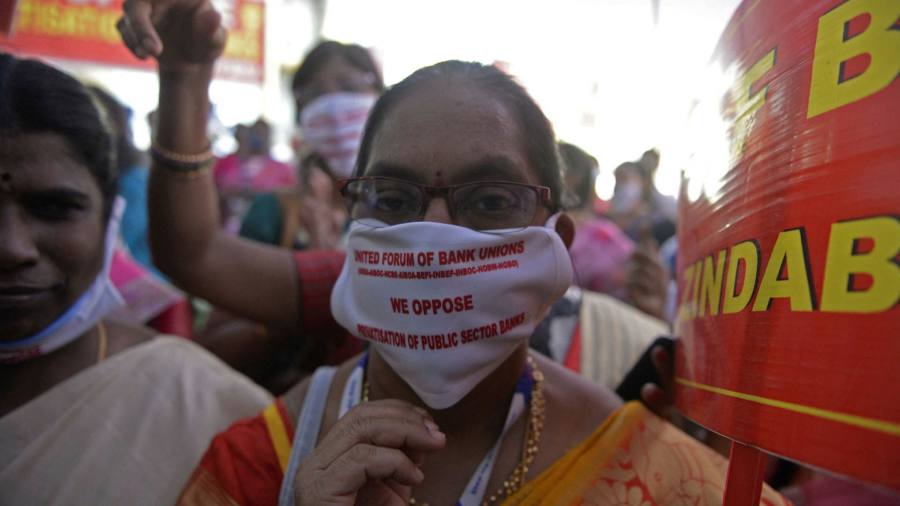[ad_1]
Public sector bank workers across India are striking in protest against Narendra Modi’s plans to privatise two state-owned lenders, setting up an early challenge to his ambitious reform drive.
The United Forum of Bank Unions, which represents nine unions, said that as many as 1m employees and officers would strike on Monday and Tuesday to oppose “retrograde banking reformsâ€. Banking services are expected to be severely curtailed by the strike.
In its budget for the year starting April, Modi’s government said it would privatise the lenders as part of a market-reform drive that ranges from selling state-owned companies to reforming agricultural and labour laws.
India needs to bolster its revenues urgently after the coronavirus pandemic dealt a severe blow to the previously fast-growing economy. But the reform plans will probably face further resistance at the same time as the government wages a fierce political battle over efforts to open up the farming sector to greater private participation.
“India reforms when its back is to the wall, and right now its back is to the wall,†said Shumita Deveshwar, an economist at research firm TS Lombard.
She continued: “The intent to reform is there. Of course there’s a lot between the intent and the actual implementation. There has always been a big gap. But the fact that the government has a popular mandate, that Modi remains extremely popular, and the economy is in crisis — this is [the moment].â€Â
The government is targeting a fiscal deficit of 9.5 per cent of gross domestic product this financial year, ending this month, and 6.8 per cent next year. It wants to raise Rs1.75tn ($24bn) by selling its stakes in everything from aviation to shipping.
India’s banking sector is dominated by 12 state lenders that account for around two-thirds of assets, the enduring legacy of the country’s socialist past. It is unclear which two banks would be sold.
Many economists said that reforming the system was vital to revamping a sector that has been plagued by chronic bad debts, slow credit growth and governance failings.
Latest coronavirus news

Follow FT’s live coverage and analysis of the global pandemic and the rapidly evolving economic crisis here.
The share of bad loans is forecasted to rise sharply, owing to Covid lockdowns. The Reserve Bank of India estimates that the ratio of non-performing assets will climb as high as 14.8 per cent in September from 7.5 per cent the same time last year.
However, some economists worry that authorities risk going too far in opening up India’s financial sector to corporate influence.
An RBI working group paper last year was criticised for proposing that conglomerates be allowed to own banks. Opponents argued it would give tycoons undue influence over ever more sectors of the economy.
Raghuram Rajan, a former RBI governor and professor at the University of Chicago, told the Press Trust of India this month that “it would be a colossal mistake to sell the banks to industrial housesâ€.
[ad_2]
Source link






